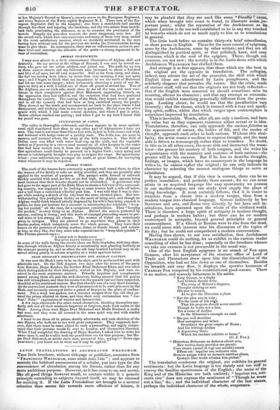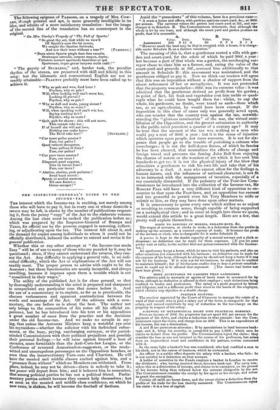LATIN TRANSLATIONS BY ARCHDEACON WRANGHAM. THIS little brochure, without titlepage
or publisher, emanates from
FRANCISCUS WRANGHAM, [LIMO eta& inito 741o"; and appears to contain the habitual amusements of a scholar, put into type for the convenience of circulation among his friends, rather than for any more ambitious purpose. However, as it has come to us, and seems, like all good things however small, to contain within it a generic principle extending to subjects beyond itself, we may be excused for noticing it. If the Latin Translations are brought to a severer criterion than seems fair towards mere effusions of leisure, it may be pleaded that they are used like some "friendlY1' cause, which when brought into court is found, to illustrate sorra% im- portant point; whilst the reputation of the Archdeacon as elegant Latinist is far too well established to be in any way touched by remarks which do not so much apply to him as to translations in generaL The little book before us contains thirty-six brief miscellanies, or short poems in English. These for the most consist of epigrams, some by the Archdeacon, some by other writers; and they are all distinguished by poetical spirit, or that polished, keen, and easy terseness, which is the soul of the epigram. These, though not common, are not new ; the novelty is in the Latin dress with which Archdeacon WRANGHAM has clothed them.
And strange it at first appears, that those which are the best in
the original are the opposite in translation. The collegian, indeed, may admire the art of the prosodist, the skill with which English ideas are adumbrated by Latin paraphrases, and the scholarly elegance that pervades the verses. But the critic, made of sterner stuff, will see that the originals are not truly reflected— that if the English were removed we should sometimes miss its meaning, oftener its character ; and that any attempt at retransla- tion would exhibit something generically different from the proto- type. Looking closer, he would see that the peculiarities vary inversely ; that the theme, which is treated with a racy and spark- ling spirit, suffers, whilst that which verges upon commonplace is sometimes improved by translation.
This is inevitable. Words, after all, are only a medium, Ind have no value but as they represent existence either actual or in idea. Translations, therefore, can only approach the curiosa felicitas as the appearances of nature, the habits of life, and the modes of thought, approach each other in both nations. Without this simi- larity, the artist wants a medium to express thought, and the most able is driven to transmogrify rather than to translate. No doubt, in this as in all other cases, the more able and instructed the trans-. lator—the greater his mastery of both tongues, and the wider his acquaintance with the manners and customs of both nations—the greater will be his success. But if he has to describe thoughts, feelings, or images, which have no counterpart in the language he writes in, he cannot reflect the original ; he can only indicate its character by selecting the nearest analogous things to serve as substitutes.
It may be argued, that if this view is correct, there can be no perfect translation : and probably there cannot ; for we can never attain in an acquired language the easy spontaneity we possess in our mother-tongue, nor can study ever supply the place of living knowledge. It most certainly follows, that it is easier to translate from a classic into a modern tongue, than from a modern tongue into classical language. Greece indirectly by her literature and arts, and Rome very directly by her laws and in- stitutions, have operated upon the whole of the civilized world. There is therefore a large spirit of antiquity in modern thought, and perhaps in modern habits ; but there can be no modern counterpart in antiquity, beyond general principles or general commonplaces. If a Greek or Roman were to rise from the dead, we could enter with interest into his discussion of the topics of Ms day ; but he could not comprehend a modern conversation. Having thus shown, to our own satisfaction, that Archdeacon WRANGHAM could do nothing, let us exhibit to the curious reader something of what he has done ; especially as the brochure whence we take our extracts is not procurable in the usual way. One of the best English epigrams is an attack of Fox upon Grmsow, after his acceptance of the sinecure office of Lord of Trade and Plantations drew upon him the dissatisfaction of the Opposition, who had set him down as one of themselves. Besides its breadth and easy flow, it displays the sportive keenness of CHARLES Fox tempered by his constitutional good-nature. There is no malice, and scarcely bitterness in his satire.
" King George, in a fright Lest Gibbon should write The story of Britain's disgrace, Thought nothing so sure His pen to secure, As to give the Historian a place.
"But the plan was in vain; 'Tis the curse of his reign That his projects should never succeed Though be wrote not a line, Yet a cause of decline In the Historian's example we read.
" His pen well describes How corruption and bribes Overthrew the great empire of Rome ; And his writings declare A degeneracy there, Which his conduct exhibits at home."
(C. J. Fox.) "Historical!' Britonum ne dedecus ederet tevo, Rex veritus donis provides ora premit. Cara tamen (semel id regi non accidit) omnis Effuse est: loquitur res, reticent° viro. Rom= quippe refert ut merserit ambito. altam, Qat:ague liber tradit crimina vita probat."
The translation condenses the original, yet exhibits its general sentiments; but the Latin language is too stately and too stiff to convey the familiar sportiveness of the English ; the name of the King and of the Historian are both omitted; " loquitur res, reti- cente viro" does not express the sentiment of "Though he wrote not a line," &c.; and the individual character of the last stanza, perhaps the individual character of the whole, evaporates.
The following epigram of Peasows, on a tragedy of Mrs. Cow- LEy, though pointed and apt, is more generally intelligible in its idea, and admits of a more satisfactory translation : but the image of the second line of the translation has no counterpart in the
original.
"Os Mrs. Cowley's Tragedy of The Fall of Sparta.'
"So great thy art, that while we view'd Of Sparta's sons the lot severe, We caught the Spartan fortitude, And saw their woes without a tear?" (PARSONS.)
"Dora nimbi Spartie pingis dnna fats ruentis, Stratosque ostendis, corpora magna, daces; Virtutem nosmet spectando haurimus et ipsi Spartanam, inque genes lacryma null& cadit "
"The gayety of SUCKLING," and, harder task, the peculiar rhythm of the stanza, are preserved with skill and felicity in this song: but the idiomatic and conventional English are not so readily attainable—PrAurns probably must have been called up to achieve it.
(Sucutrao.)
"Why so pale and wan, fond lover ?
Prythee, why so pale?
Will, when looking well can't move her, Looking ill prevail ?
Prythee, why so pale ?
"Why so dull and mute, young sinner ? Prythee, why so mute ?
Will, when speaking well can't win her, Saying nothing do't?
Prythee, why so mute?
"Quit, quit for shame : this will not move, This cannot take her: If of herself she will not love,
Nothing can make her—
The Devil take her!"
"Cur tener palles amator ? Fare, cur Pales?
Quad rubenti denegatur, Tune pallens id feces?
Fare, cur palles?
"Cur puer 'Meet; amator ?
Fare, cur taces ?
Eloquenti quod negatur, Idne tu tacens feres ?
Fare, cur taces?
" Abstine, abatine, proh pudorem !
Istud baud movet : Sponte ni seutiat amorem, Nil earn fiectet- Oreus occupet!"



























 Previous page
Previous page